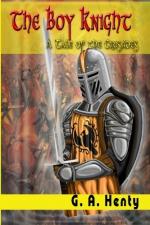The baron, when fiercely fighting, was slain by an arrow from the keep above, and with his fall the last resistance ceased. A short time was spent in searching the castle, binding the prisoners, and carrying off the valuables that the baron had collected in his raids. Then a light was set to the timbers, the granaries were fired, and in a few minutes the smoke wreathing out of the various loopholes and openings told the country round that the stronghold had fallen, and that they were free from the oppressor at last.
CHAPTER IV.
The crusades.
Warm thanks and much praise were bestowed upon Cuthbert for his share in the capture of the castle, and the earl, calling the foresters round him, then and there bestowed freedom upon any of them who might have been serfs of his, and called upon all his knights and neighbors to do the same, in return for the good service which they had rendered.
This was willingly done, and a number of Cnut’s party, who had before borne the stigma of escaped serfs, were now free men.
We are too apt to forget, in our sympathy with the Saxons, that, fond as they were of freedom for themselves, they were yet severe masters, and kept the mass of the people in a state of serfage. Although their laws provided ample justice as between Saxon man and man, there was no justice for the unhappy serfs, who were either the original inhabitants or captives taken in war, and who were distinguished by a collar of brass or iron round their neck.
Cnut’s party had indeed long got rid of these badges, the first act of a serf when he took to the woods being always to file off his collar; but they were liable when caught to be punished, even by death, and were delighted at having achieved their freedom.
“And what can I do for you, Cuthbert?” Sir Walter said, as they rode homeward. “It is to you that I am indebted: in the first place for the rescue of my daughter, in the second for the capture of that castle, which I doubt me much whether we should ever have taken in fair fight had it not been for your aid.”
“Thanks, Sir Walter,” the lad replied. “At present I need nothing, but should the time come when you may go to the wars I would fain ride with you as your page, in the hope of some day winning my spurs also in the field.”
“So shall it be,” the earl said, “and right willingly. But who have we here?”
As he spoke a horseman rode up and presented a paper to the earl.
“This is a notice,” the earl said, after perusing it, “that King Richard has determined to take up the cross, and that he calls upon his nobles and barons to join him in the effort to free the holy sepulcher from the infidels. I doubt whether the minds of the people are quite prepared, but I hear that there has been much preaching by friars and monks in some parts, and that many are eager to join in the war.”




